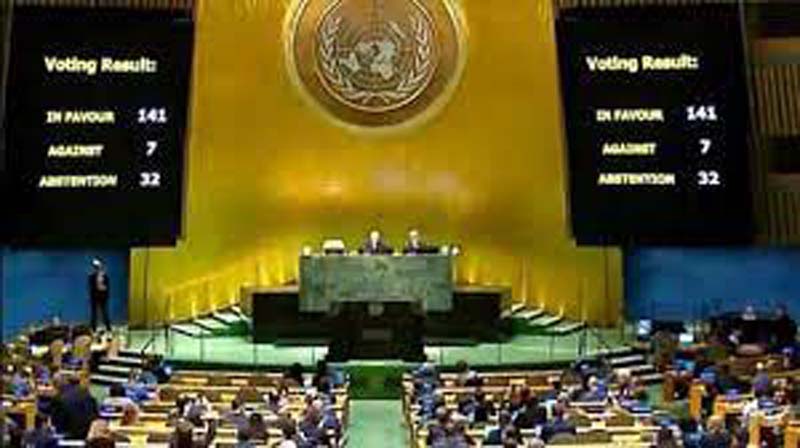Terrorism is an “intractable malignancy” that transcends borders, nationality, and race, and India has unequivocally conveyed to the UN General Assembly its stance against any rationalisation of terrorist acts. India abstained from voting on a resolution related to the Israel-Hamas conflict, emphasising that violence as a means to achieve political objectives indiscriminately inflicts harm and offers no path to enduring solutions. India condemned the terror attacks in Israel and stressed that terrorism knows no boundaries, emphasising the need for a zero-tolerance approach to terrorism. India expressed hope that the General Assembly’s deliberations would convey a resolute message against terrorism and violence while addressing the humanitarian crisis in the region. Additionally, India called for the immediate and unconditional release of hostages and reiterated its support for a negotiated two-state solution in the Israel-Palestine conflict.
Over this time, India has consistently stressed the utmost urgency of tackling terrorism without discriminating between so-called “good” and “bad” terror. Unfortunately, global unity in this approach remains elusive, resulting in numerous countries being afflicted by terrorism at one point or another. This affliction has taken root in nearly all nations worldwide, transcending the boundaries of underdeveloped, developing, and even the most advanced countries. In recent years, India has vociferously emphasised the imperative of the “no money for terror” initiative. Furthermore, India has fervently advocated taking rigorous action against countries that support and sponsor terrorism, exposing and isolating them on the international stage. Regrettably, little substantive progress has been made in this direction. Even a country like Pakistan, which found itself on the Grey List of the Financial Action Task Force (FATF), has managed to escape stringent consequences. This sends a profoundly misguided message and provides virtually no deterrence.
Regarding the Israel-Palestine conflict, there can be no justification for acts of terrorism. Attacking a sovereign nation in such a brutal manner, involving the heinous murder of hundreds and the abduction of hundreds more can never be condoned. The level of violence on display has shocked and deeply shaken the entire world. No nation can reasonably justify such egregious violence. Meanwhile, the suffering of the people of Gaza must be considered. While it is undeniable that the people of Gaza have been exploited as human shields, and Israel has the right to respond, innocent civilians have undeniably become the victims of this entire episode. The call for humanitarian aid to the people of Gaza has received support from the majority of countries, with 121 out of 193 member countries voting in favour. India has also backed this aid effort, having already sent 38 tonnes of humanitarian supplies. However, India abstained from the vote as it maintains close ties with Israel, a steadfast all-weather friend, while simultaneously supporting an independent Palestine.
It is an undeniable fact that for long-term peace to take root in that volatile region, both Israel and Palestine must coexist independently through peaceful means. The recent conflict has once again thrust the Israel-Palestine issue into the global spotlight, and it is now the responsibility of the United Nations to facilitate an amicable resolution acceptable to both sides. The world is currently mired in multiple conflicts, with the Ukraine-Russia war already impacting a significant number of nations. The Israel-Palestine conflict can potentially exacerbate the global situation. Regrettably, underdeveloped and developing countries bear the heaviest burden in all this turmoil. The economic interdependence of this conflict-ridden region is valued in trillions of dollars. Any escalation in the conflict, as initial indications suggest, will have catastrophic repercussions worldwide. With global economies already teetering on the brink, an escalation could trigger a worldwide cataclysm. The United Nations must now formulate a strategy to combat terrorism at all costs. This menace has persisted for decades, with no definitive solution in sight. Countries must stand united against violence in today’s interconnected world.
Trending Now
E-Paper


